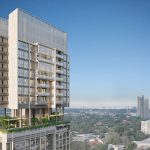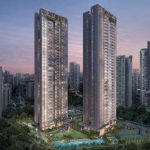RTS Link Development conclusion is within sight confirmed the Malaysian Transport Minister, Anthony Loke Siew Fook. Writing in his Facebook on Jan 10 about the RTS Link Development conclusion, Mr Loke said:
“Paid a visit to Singapore’s Transport Minister Mr Khaw Boon Wan and discussed the progress on the RTS project between JB and Woodlands. It was a fruitful discussion and both of us are committed to conclude the agreement by April this year.”
In September last year, Mr Loke said that the decision on whether to continue with the construction of the Johor Bahru-Singapore Rapid Transit System (RTS) Link has been postponed. No reasons were given for the postponement of decision on the RTS Link Development. Malaysia had agreed to reimburse Singapore for the abortive costs incurred – around S$600,000 – due to the suspension. But no costs will be incurred by the Malaysian side due to the postponement.
Minister for Transport, Mr Khaw Boon Wan, said in May that at Malaysia’s request and in the spirit of bilateral cooperation, Singapore has agreed to suspend the construction of the JB–Singapore RTS Link Project for a period up to 30 September 2019.
Mr Khaw added that Malaysia will bear the abortive costs in suspending the RTS Link Project, and that if by 30 September 2019, Malaysia does not proceed with the RTS Link Development, Malaysia will also bear the agreed costs incurred by Singapore in fulfilling the RTS Link Bilateral Agreement (BA).

“The amount that will be paid to the Singapore government is about S$600,000 for the suspension period that will be until September 31 this year. The cost of the suspension is not compensation for the project, but the amount the Singapore government had spent on the implementation of the RTS project in the republic,” Malaysian Transport Minister Anthony Loke Siew Fook said after signing a supplementary agreement on the RTS Link Project suspension at the PSA Building in Alexandra Road here today.
In exchanging the legal documents in Singapore to vary the BA based on the new understanding, Mr Khaw said that this is a temporary setback for the RTS Link Development.
Table of Contents
https://www.icompareloan.com/resources/woodlands-regional-centre/
“But I remain optimistic that the project could resume in due course,” he said. Adding, “the cross-border congestion is real and only a decisive project like the RTS can make a material difference to the current situation.”
The idea of a Mass Rapid Transit between Singapore and Johor Bahru was first suggested in 1991 when then Singapore Minister for Communications Mah Bow Tan said that the Woodlands MRT line, now part of the North South MRT line, would be designed to accommodate such an extension. The idea was endorsed and agreed to in principle by both countries.
The rapid transit system was then revisited two decades later and proposed during the Singapore-Malaysia Leaders’ Retreat on 24 May 2010. The Rapid Transit System revival imagined the idea of linking Tanjung Puteri, Johor Bahru and Singapore, aiming to ease traffic congestion on the Johor–Singapore Causeway and enhance connectivity between the two countries. It was targeted to be operational by 2018.
In June 2011, Singapore informed Malaysia that the rail link will be a northern extension of Thomson-East Coast Line Stage 1, which will start at Woodlands North MRT/RTS station. In September 2014, the Johor Public Works, Rural and Regional Development committee chairman Datuk Hasni Mohammad announced that Malaysia had chosen Bukit Chagar as its terminating station, over Tanjung Puteri, JB Sentral 1 and JB Sentral 2. The terminal would have its own Customs and Immigration clearance facilities, separate from the existing facilities at Sultan Iskandar Building.
The RTS Link Development conclusion comes after Singapore and Malaysia signed a bilateral agreement on the project in Jan 2018. The agreement finalised certain aspects of the project, including its maintenance facilities, operator, and customs facilities. Construction of the 4km link was set to begin in 2019.
But in January 2019, Singapore’s Minister of Transport, Khaw Boon Wan informed that the RTS Link Development conclusion is not progressing well, with Malaysia missing deadlines that were set in the bilateral meeting in 2018. Deadlines were extended as soon as they were negotiable – the first until September 2018, then December 2018, then February 2019.
Mr Khaw said that the bilateral agreement does not provide suspension unlike that of the Kuala Lumpur-Singapore High-Speed Rail. “However, in the spirit of bilateral relations we can always work out some amendments,” he said, adding that “the immediate first step is to settle, finalise and sign the supplementary agreement which can be done soon”.
The announcement of the RTS Link Development conclusion will add to the prospects to the property developments in the Woodlands area.
https://www.icompareloan.com/resources/rapid-transit-system-revival/
This is because the Urban Redevelopment Authority (URA) has already marked the growth of the Woodlands Regional Centre as an anchor development of the North Coast into an innovative corridor buzzing with ideas, creative design and new technologies. The Woodlands Regional Centre is currently well served by the existing Woodlands North-South Line MRT station and Woodlands Bus Interchange, and with the upcoming completion of the new Thomson Line stations at Woodlands and Woodlands North, there will be excellent accessibility to the city.
With more than 100ha of available land for development, Woodlands Regional Centre is poised to capitalise on its unique waterfront location and assets to be the Northern Gateway to Singapore. Woodlands Central is envisioned as the retail and mixed use cluster, while Woodlands North Coast will be the business and residential cluster, with 4 unique precincts:
- Admiralty Park & Waterfront Residential Precincts: Waterfront and garden residences
- Central Boulevard Mixed Use Precinct: Office and business park uses along signature green boulevards
- Northshore Innovation Precinct: Business opportunities for SMEs
Woodlands Regional Centre is the only regional centre to be located near the waterfront.






